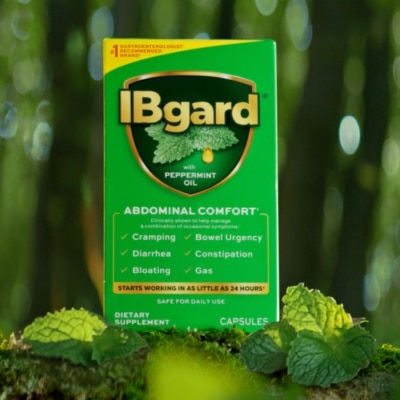

Peppermint Oil: A Timeless Herbal Elixir for Health and Wellness
11 Sep 2024
Peppermint oil is a versatile and widely recognized herb with a rich history of traditional use. Its invigorating aroma and calming properties have made it a popular choice for various health purposes, ranging from breath freshening to gut health.
Historical Use of Peppermint in Traditional Practices
Peppermint has been used for centuries in traditional practices across different cultures. Its aromatic properties often make it an ingredient in many aromatherapy products, as well as a common flavoring agent in foods and beverages. However, records from ancient Greece, Rome, and Egypt mention that it was used for digestive health. In modern times, the use of peppermint remains consistent with traditional use, being one of the leading ingredients used to help manage symptoms of an occasionally distressed gut.
Peppermint Oil & Gut Health
Gut health refers to the optimal functioning and balance of the gastrointestinal system, including the stomach, small intestine, and large intestine. It involves the proper digestion, absorption, elimination of food, and maintaining a healthy gut microbial balance. A healthy gut is essential for overall well-being as it plays a crucial role in nutrient absorption, immune function, and even mental health. Occasional Temporary imbalances or disturbances in gut health can lead to occasional digestive issues, such as bloating, constipation, and diarrhea. Peppermint oil has gained significant attention in addressing these issues because it relaxes the muscles of the gastrointestinal tract, reducing occasional spasms, cramping, bloating, flatulence, and indigestion. However, it is important to consult a healthcare professional before using peppermint oil for gut health.
Peppermint Oil and Other Uses
Aside from its impact on gut health when taken orally, peppermint oil offers a range of other health benefits when applied topically or used as aromatherapy. When applied to the skin, it has been shown to support muscle, joint, and skin comfort. Peppermint oil’s aromatic properties also have been promoted for immune support, relaxation, and clearing the mind, and has also been used as a natural insect repellent.
How to Incorporate Peppermint Oil into Daily Routines
Incorporating peppermint oil into daily routines is easy and enjoyable. Here are a few suggestions:
- Aromatherapy: Add a few drops of peppermint oil to a diffuser or inhale directly from the bottle to experience its invigorating scent and promote mental clarity.
- Massage: Dilute peppermint oil with a carrier oil, such as coconut or jojoba oil, and use it for a revitalizing massage to relieve muscle tension and promote relaxation.
- Oral Health: Add a drop of peppermint oil to your toothpaste or mouthwash for a refreshing and cooling sensation. It may also help freshen breath.
- Culinary Uses: Use a drop or two of food-grade peppermint oil to enhance the flavor of beverages, desserts, or savory dishes. Exercise caution and use sparingly due to its potent nature.
- Supplement: Take a high-quality supplement like IBgard® that has been specially formulated using Site-Specific Targeting® (SST®) technology to help deliver the peppermint oil to where it is needed, while also minimizing potential for heartburn.† IBgard® has been clinically shown to help manage a combination of occasional symptoms, including cramping, diarrhea, bowel urgency, constipation, and gas.†
Peppermint oil has a long-standing history as an herbal extract with numerous benefits that continue to be recognized today. From its historical uses in traditional practices to the scientific evidence supporting its role in gut health and its wide range of other health benefits, peppermint oil is a powerful solution. By incorporating peppermint oil into daily routines, individuals can harness its potential and enjoy it's refreshing and health supporting effects.
†These statements have not been evaluated by the Food and Drug Administration. This product is not intended to diagnose, treat, cure, or prevent any disease
References
U.S. Department of Health and Human Services. (n.d.). Peppermint oil. National Center for Complementary and Integrative Health. https://www.nccih.nih.gov/health/peppermint-oil
Wiertsema, S. P., van Bergenhenegouwen, J., Garssen, J., & Knippels, L. M. J. (2021, March 9). Nutrients. https://www.ncbi.nlm.nih.gov/pmc/articles/PMC8001875/


